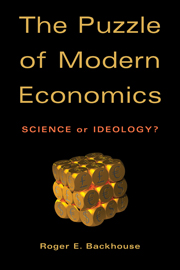10 - Economic Science and Economic Myth
Published online by Cambridge University Press: 05 June 2012
Summary
THREE ROUTES TOWARDS ECONOMIC KNOWLEDGE
One of the main reasons economics receives so much criticism is that much economic reasoning is based on what can best be called common sense. Not only do economic theories deal with everyday phenomena, such as households, firms and markets, but many of the mechanisms that economists analyse are familiar from everyday experience. It should not take training in economics to figure out that if there is a shortage of something, its price is likely to rise, or that it is riskier to hold stock in a single company than to hold a diversified portfolio. Technical economics appears often to be formalizing common sense ideas and either proving what does not need to be proved (because it is obvious) or losing track of reality as economists make the abstractions necessary to apply their formal techniques. So the question ‘What do economists know?’ is about method: ‘How do the techniques available to economists produce knowledge that goes beyond that which is clear using common sense?’
The obvious way to create economic knowledge is to create statistics. Everyone knows about the prices of toothpaste, bread, strawberries, mobile phone contracts, and the myriad of products that we consume, but without systematic analysis it is impossible to see what is happening to prices as a whole. Thanks to government statisticians, we can attach a number to the rate of inflation or the price level.
- Type
- Chapter
- Information
- The Puzzle of Modern EconomicsScience or Ideology?, pp. 167 - 186Publisher: Cambridge University PressPrint publication year: 2010



